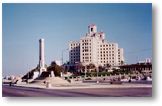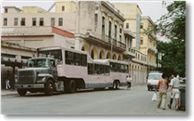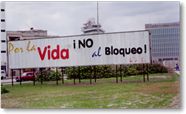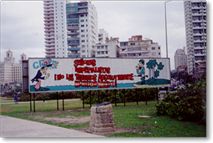|
|
|
 |
 |
  |
||
 |
 |
||
|
A new hotel built in partnership with the Spanish Meliá chain takes shape in the Miramar district of Havana. |
|||
Cuba is a very changed place today from what it was the first time I visited there twenty years ago. A new generation has emerged which shares many of the same aspirations and frustrations of most youth in the United States and throughout the world. ¡Cubanía! is dedicated to this generation, in the hope that it may not only fulfill its role of guiding Cuba into the next century, but also that it help to present some options to the rest of us around the world. |
||||
| The "Special Period in Peacetime" | ||||
 |
There is frequent reference in ¡Cubanía! to "the Special Period in Peacetime," a term applied to the Cuban reality since the early 1990s, when trading relationships between Cuba and the former socialist countries came to an abrupt halt. Always improvisational in the face of material problems, Cubans were forced to tighten their belts and become even more inventive in order to survive. Resources previously taken for granted in schools, hospitals, workplaces and households became scarce. Cuba was forced to begin changing the way it dealt with the world. In 1993, the U.S. dollar was legalized in order to attract foreign currency and to ease pressures on the population. Foreign investment in tourism and other economic sectors - a process begun earlier - was more aggressively sought out. Many private business activities were legalized or became more common than before. The results of this process play themselves out daily in many ways. In the artistic arena for example, more and more talent is being exported or is exporting itself so that artists can earn better wages and generate income for the whole economy. But in spite of the difficulties, Cuba still maintains its commitment to free universal education - including cultural and artistic education - and continues to make other scientific and social advances. |
|||
A camello or "camel" bus in Centro Habana. Cuba's once renowned public transport system was crippled with the Special Period. Camellos were created to carry large numbers of people into Havana from the suburbs, but are now being slowly phased out as the country purchases newer buses and parts from abroad. |
||||
 |
||||
"For life: No to the Blockade!" reads a billboard of the Union of Young Communists |
||||
|
|
||||
Cuba - U.S. Relations |
||||
|
|
 |
|||
The United States Interests Section in Havana |
The Cuban response across the street: "Imperialists: We Have Absolutely No Fear of You!" |
|||
|
||||
| HOME | CUBANIA! | ABOUT CUBA | ARTIST INTERVIEWS | LINKS | EMAIL | ||||